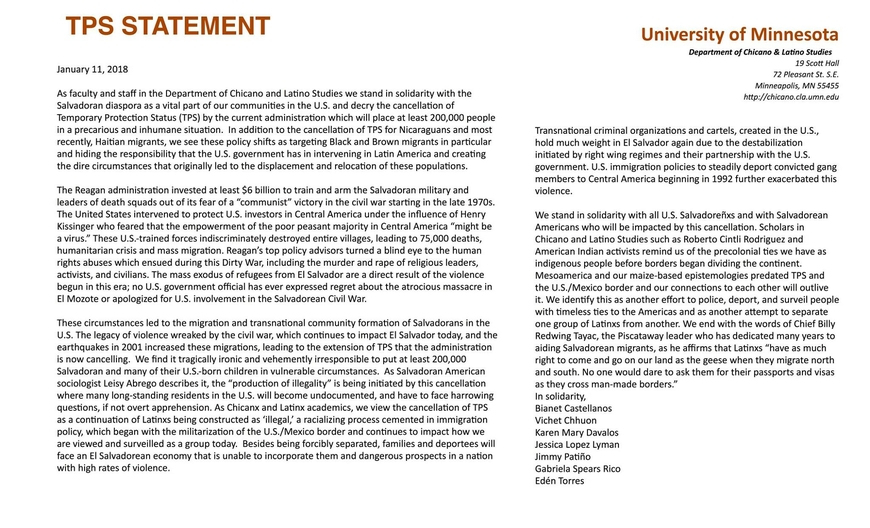Department Statement on the latest TPS decision.
January 11, 2018
As faculty and staff in the Department of Chicano and Latino Studies, we stand in solidarity with the Salvadoran diaspora as a vital part of our communities in the U.S. and decry the cancellation of Temporary Protection Status (TPS) by the current administration which will place at least 200,000 people in a precarious and inhumane situation. In addition to the cancellation of TPS for Nicaraguans and most recently, Haitian migrants, we see these policy shifts as targeting Black and Brown migrants in particular and hiding the responsibility that the U.S. government has in intervening in Latin America and creating the dire circumstances that originally led to the displacement and relocation of these populations.
The Reagan administration invested at least $6 billion to train and arm the Salvadoran military and leaders of death squads out of its fear of a “communist” victory in the civil war starting in the late 1970s. The United States intervened to protect U.S. investors in Central America under the influence of Henry Kissinger who feared that the empowerment of the poor peasant majority in Central America “might be a virus.” These U.S.-trained forces indiscriminately destroyed entire villages, leading to 75,000 deaths, humanitarian crisis, and mass migration. Reagan’s top policy advisors turned a blind eye to the human rights abuses which ensued during this Dirty War, including the murder and rape of religious leaders, activists, and civilians. The mass exodus of refugees from El Salvador are a direct result of the violence begun in this era; no U.S. government official has ever expressed regret about the atrocious massacre in El Mozote or apologized for U.S. involvement in the Salvadorean Civil War.
These circumstances led to the migration and transnational community formation of Salvadorans in the U.S. The legacy of violence wreaked by the civil war, which continues to impact El Salvador today, and the earthquakes in 2001 increased these migrations, leading to the extension of TPS that the administration is now canceling. We find it tragically ironic and vehemently irresponsible to put at least 200,000 Salvadoran and many of their U.S.-born children in vulnerable circumstances. As Salvadoran American sociologist Leisy Abrego describes it, the “production of illegality” is being initiated by this cancellation where many long-standing residents in the U.S. will become undocumented, and have to face harrowing questions, if not overt apprehension. As Chicanx and Latinx academics, we view the cancellation of TPS as a continuation of Latinxs being constructed as ‘illegal,’ a racializing process cemented in immigration policy, which began with the militarization of the U.S./Mexico border and continues to impact how we are viewed and surveilled as a group today. Besides being forcibly separated, families and deportees will face an El Salvadorean economy that is unable to incorporate them and dangerous prospects in a nation with high rates of violence. Transnational criminal organizations and cartels, created in the U.S., hold much weight in El Salvador again due to the destabilization initiated by right-wing regimes and their partnership with the U.S. government. U.S. immigration policies to steadily deport convicted gang members to Central America beginning in 1992 further exacerbated this violence.
We stand in solidarity with all U.S. Salvadoreñxs and with Salvadorean Americans who will be impacted by this cancellation. Scholars in Chicano and Latino Studies such as Roberto Cintli Rodriguez and American Indian activists remind us of the precolonial ties we have as indigenous people before borders began dividing the continent. Mesoamerica and our maize-based epistemologies predated TPS and the U.S./Mexico border and our connections to each other will outlive it. We identify this as another effort to police, deport, and surveil people with timeless ties to the Americas and as another attempt to separate one group of Latinxs from another. We end with the words of Chief Billy Redwing Tayac, the Piscataway leader who has dedicated many years to aiding Salvadorean migrants, as he affirms that Latinxs “have as much right to come and go on our land as the geese when they migrate north and south. No one would dare to ask them for their passports and visas as they cross man-made borders.”
In solidarity,
Bianet Castellanos
Vichet Chhuon
Karen Mary Davalos
Jessica Lopez Lyman
Jimmy Patiño
Gabriela Spears Rico
Edén Torres


